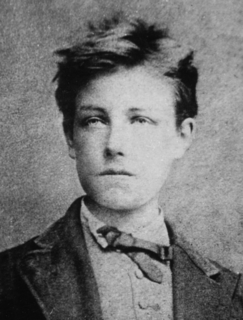A Quote by D. H. Lawrence
It seems to me a purely lyric poet gives himself, right down to his sex, to his mood, utterly and abandonedly, whirls himself roundtill he spontaneously combusts into verse. He has nothing that goes on, no passion, only a few intense moods, separate like odd stars, and when each has burned away, he must die.
Related Quotes
The poet who writes "free" verse is like Robinson Crusoe on his desert island: he must do all his cooking, laundry and darning for himself. In a few exceptional cases, this manly independence produces something original and impressive, but more often the result is squalor - dirty sheets on the unmade bed and empty bottles on the unswept floor.
Often nothing keeps the pupil on the move but his faith in his teacher, whose mastery is now beginning to dawn on him .... How far the pupil will go is not the concern of the teacher and master. Hardly has he shown him the right way when he must let him go on alone. There is only one thing more he can do to help him endure his loneliness: he turns him away from himself, from the Master, by exhorting him to go further than he himself has done, and to "climb on the shoulders of his teacher."
He who asks to receive his daily bread does not automatically receive it in its fullness as it is in itself: he receives it according to his own capacity as recipient. The Bread of Life (cf. Jn. 6:35) gives Himself in His love to all who ask, but not in the same way to all; for He gives Himself more fully to those who have performed great acts of righteousness, and in smaller measure to those who have not achieved so much. He gives Himself to each person according to that person's spiritual ability to receive Him.
He who is himself crossed in love is able from time to time to master his passion, for he is not the creature but the creator of his own misery; and if a lover is unable to control his passion, he at least knows that he is himself to blame for his sufferings. But he who is loved without reciprocating that love is lost beyond redemption, for it is not in his power to set a limit to that other's passion, to keep it within bounds, and the strongest will is reduced to impotence in the face of another's desire.
The Master gives himself up to whatever the moment brings. He knows that he is going to die, and her has nothing left to hold on to: no illusions in his mind, no resistances in his body. He doesn't think about his actions; they flow from the core of his being. He holds nothing back from life; therefore he is ready for death, as a man is ready for sleep after a good day's work.
The modern poet has no essential alliance with regular schemes of any sorts.He reserves the right to adapt his rhythm to his mood, to modulate his metre as he progresses. Far from seeking freedom and irresponsibility (implied by the unfortunate term free verse) he seeks a stricter discipline of exact concord of thought and feeling.
Anyone who is not totally dead to himself will soon find that he is tempted and overcome by piddling and frivolous things. Whoever is weak in spirit, given to the flesh and inclined to sensual things can, but only with great difficulty, drag himself away from his earthly desires. Therefore he is often gloomy and sad when he is trying to pull himself away from them, and easily gives way to anger should someone attempt to oppose him.





































